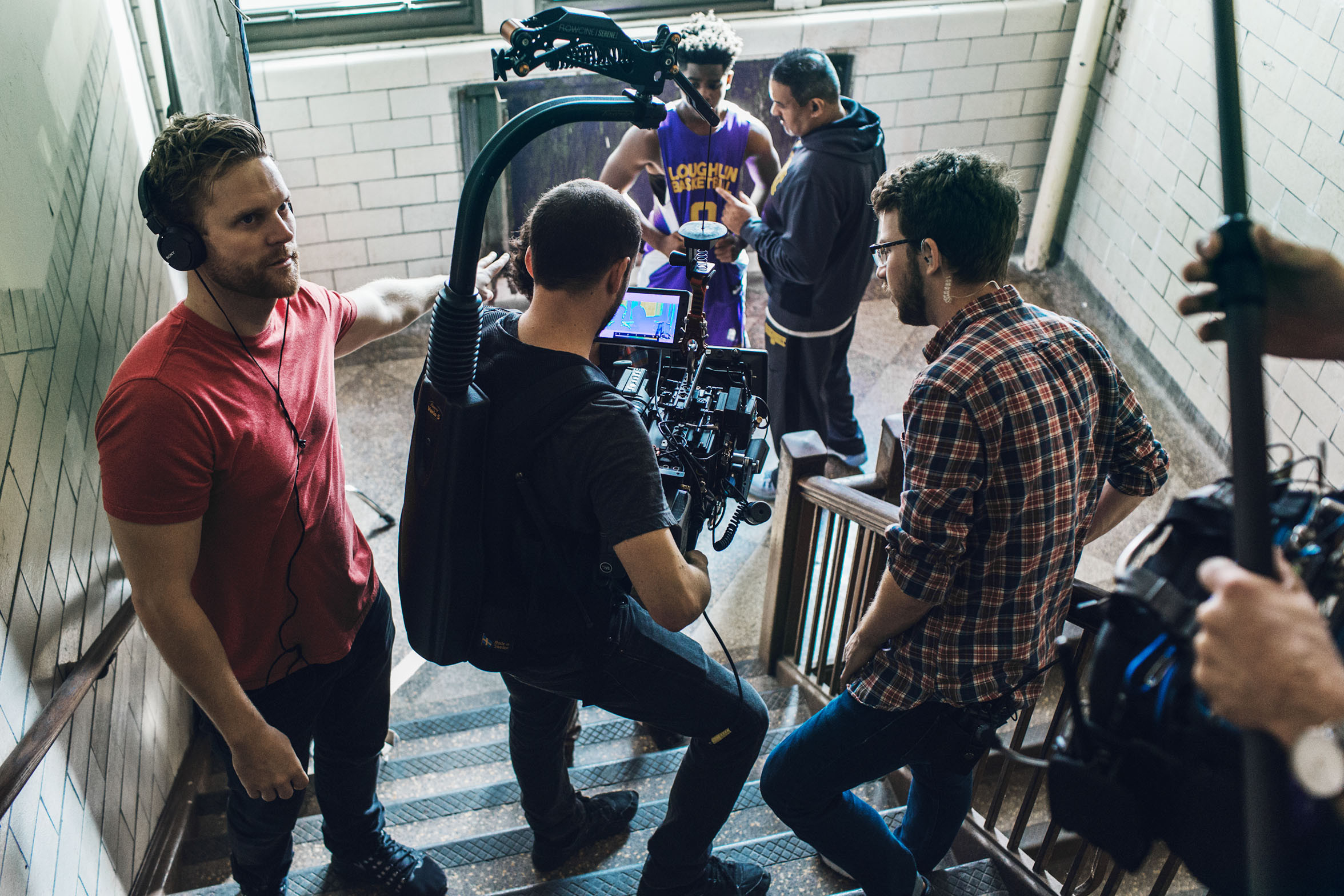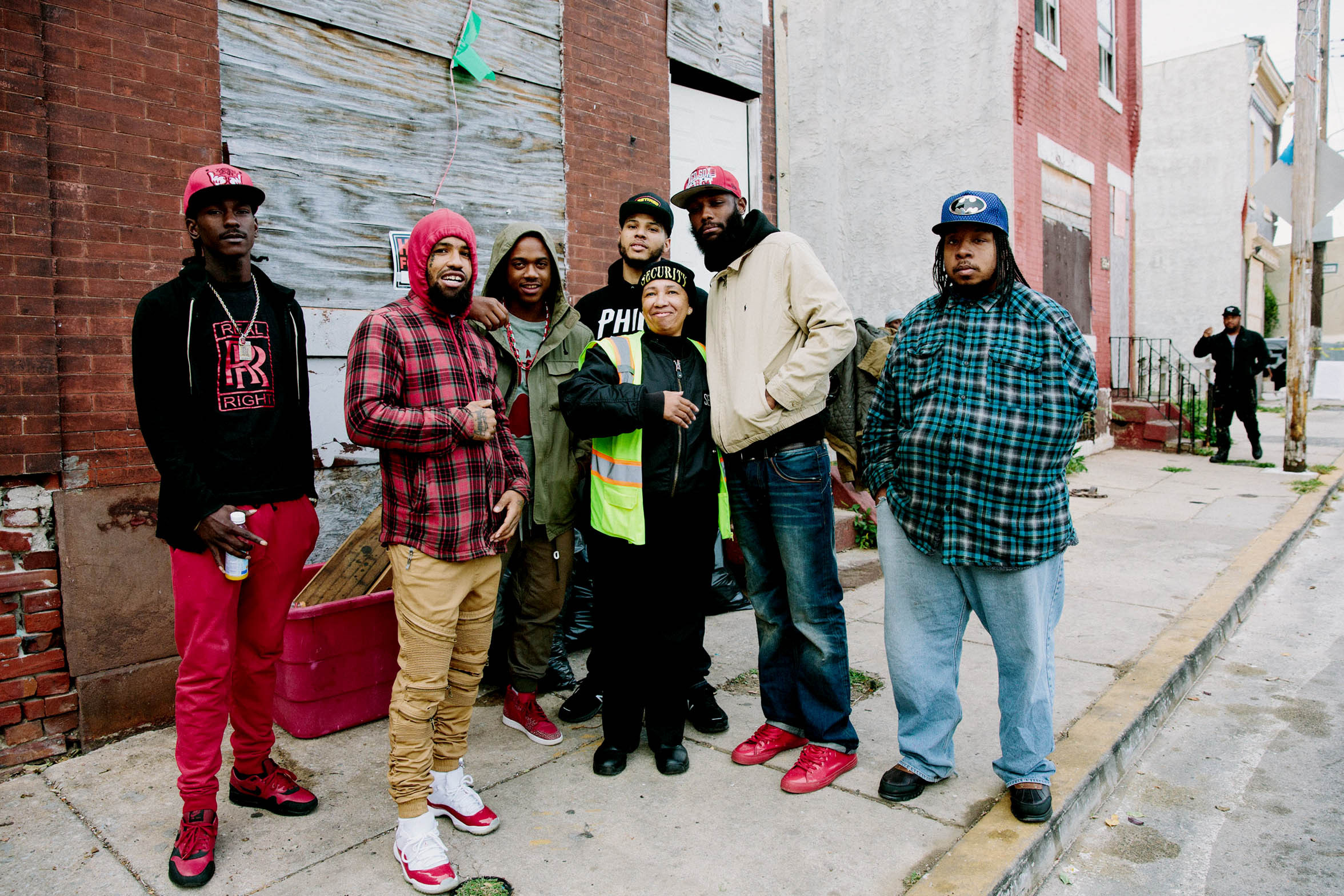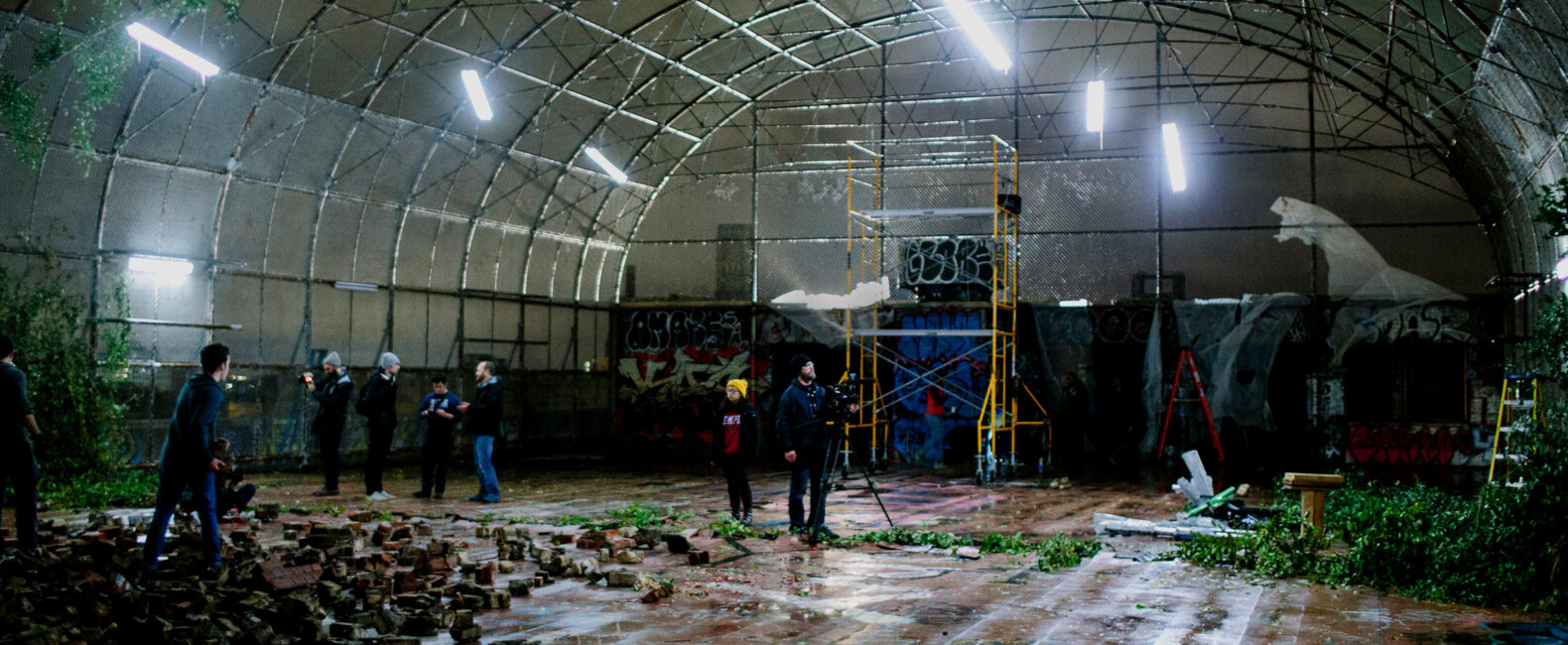When Ricky Staub, founder and director of Neighborhood Film Company, decided to make his first narrative short film, he went back to the oldest writing adage in the book: write what you know. And what did Ricky know? North Philly, that’s what. “It’s the most inspiring place I’ve ever lived,” he told us. “It’s a unique world that I don’t see explored a lot — a world I have tons of nuanced insight into.”
So he started writing, and the result was The Cage, a raw, surreal story about youth, violence, and basketball set on the unforgiving streets of Philadelphia. There was only one problem. “I immediately realized I’d written a script that required A-list performances…and we didn’t have the budget to reach out to Hollywood’s hottest stars.” That’s when Ricky made a bold decision to forgo using actors and instead cast the film using the real people who’d inspired him — the citizens of North Philly.
We talked to Ricky Staub about the joys and perils of casting and directing nonactors.
Ricky Staub: I believe this to be true: The best actors are either the Meryl Streeps of the world, or they are regular people who are the most connected to their vulnerability and suffering. People who are not ashamed of who they are and aren’t afraid of looking stupid. The people I worked with on The Cage have no ambition to be actors. But they were so present and so honest. They had an almost childlike playfulness about getting into character that made it all very enjoyable.
How did you cast the specific parts?
About half of the people are from my neighborhood. The other half are friends of our Associate Producer, Andrew. I’ll talk about a couple of them in particular.
Iesha: The woman who plays the mom of the main character, Zeke, is Iesha. Her character is on her own, overwhelmed, and making poor decisions to survive. The first time you meet her in the film, she is basically being paid for a sexual favor. In real life, Iesha is in no way a prostitute. But I know she knows those types of women. And I know she’s been through a lot of really hard things. I’ve personally seen her in some broken places. So it felt right asking her to take on this role. I told her, “I feel like you’ll understand this woman.” And she did. I think she strikes an amazing balance of broken and beautiful, all in the same frame.
OG-LAW: Another very powerful performance is from the gentleman who plays Zeke’s dad and does the voice-over. His real name is Michael Ta’Bon but he goes by OG-LAW. He’s a big social activist in Philly. He spent nine years in prison — the same prison where we shot the film. And this was the first time he’d been back. He had the look and vibe I wanted for that character. So I met him at his house and started reading lines with him. That’s how I cast the whole film: just sitting on stoops with people, running lines, seeing if they’d feel comfortable doing it. While I was there, OG started free-styling this voice-over. Originally the voice-over was going to come from Zeke, the son. But when I heard OG, I knew it should come from him. I sat there in silence, listening to him. It was incredible to see him connect with the material. After he finished reading it, he stared right into my eyes — he’s a really intense person — and he said, “You’ve been through some shit, huh?” As people like Iesha and OG connected with the story, it became theirstory that we were all telling together.


Ms. Margaret: The woman I cast as Ms. Margaret, the older woman in the story who protects these boys in the neighborhood, is exactly the same person in real life. That’s who she is. Her name really is Ms. Margaret. She wakes up at 4 a.m. every morning and prays for two hours for the boys on her block. And she brought all of that to her character. Little, amazing things. For the scene where she sees Zeke on the corner and knows he’s up to something — originally I’d written her line as, “You’re not doing anything bad, are you?” Something generic and crappy. But when we shot it, she just naturally changed the line to, “You’re not being sneaky?” I was like, “Oh my god. That’s it. That’s the line.”
William: The guy who plays Zeke is the only person in the film who isn’t from Philly. I’d done a bunch of casting in the neighborhood, but I couldn’t find the right person. So I shot an email to this casting director Mary Callahan at House Casting in New York. I said, “Hey, I’m shooting this short film. I don’t have any money for casting” — classic — “but I’m looking for a 15- to 17-year-old black kid who is incredible at basketball. He has to be incredible at basketball. And he has to be incredible at acting.” Within three minutes she wrote back. She’d just cast a feature film on streetball, and she thought one of the kids who didn’t get cast for it would be perfect. I was like, “Is he an actor?” And she was like, “Nope. He’s a basketball player.” So I met with him in a hotel room in New York, and I ran a scene with him where I played his mother. It was basically just the two of us screaming at each other while his brother waited outside. I gave him some direction to see if he could take it. But I knew immediately that William was our kid, and he turned out to be perfect.

How did you get such a great performance out of William?
I kept telling him, “Be honest. Always be listening. Don’t try to act. Just be who you are and respond.” He seemed to follow that really well, and he worked really hard. He’s a scholarship athlete, so I tried to treat him more like an athlete than an actor. For the scene where he had blood in his mouth, I remember he wasn’t showing up for it. He said the fake blood was going to make him throw up. So it was just him and me in the bathroom, and I said, “Who owns this set?” And he’s like, “I guess you do.” I said, “Yeah. Ido. Which means you’re going to do this as many times as I want you to. So until you get it right, you’re going to have to keep putting that shit in your mouth.” I said, “Give me a good performance and we’ll be done. If you keep holding back, I’m going to make you do it again.” He was like, “Fuck, okay, let’s do this!” I was constantly pushing him that way because that’s what I responded to when I was a competitive kid like him. And he was down for whatever it was. His attitude was always positive. But I think he was surprised by how hard acting is, how much it constantly required of him.
LICENSE THE SCORE FROM THE CAGE
What did you learn about getting good performances from nonactors in general?
I’d try to connect the scene to the person’s real life. Iesha is a beautiful example. She’s not a prostitute, so it wasn’t natural for her to play one. But I told her to imagine that her son had just caught her with a man who isn’t his father. “Just imagine that,” I said, “and let’s see what happens to your face.” People who aren’t actors usually don’t know what to do with their face. So I’d tell her, “You don’t have to do anything. Just think about that situation, imagine that, and the camera will do the rest.”
Another thing that worked for me was getting into the scene with them myself. In that scene with Iesha, she had to smoke a cigarette. Doing 16 takes, smoking 16 cigarettes — that’s a lot of smoking. I sat directly across from her and smoked with her. I like cigarettes, but I don’t really smoke; so I was feeling pretty shitty after that. But I didn’t want to ask them to do anything I wasn’t willing to do myself.
Sometimes to get a good take, I’d let them dialogue with me, talk about what would be going on in the minds of real people in these situations. The best acting is all about listening. If you can truly listen to a story, you’ll have a physical response, and that’s what we were trying to capture.


What did you do if you weren’t getting the performance you wanted?
I’d change the scene to something that worked. One of the hardest scenes in this film is when Iesha catches her son in the stairwell. Originally it was a much more built-out scene. They were going to go back and forth. But I quickly realized the dialogue felt false. Neither of these characters really cared to have this conversation. Zeke is embarrassed because he just got his ass beat. All he’s thinking about is revenge. And Iesha plays a woman who isn’t an engaged mom. She doesn’t want to have the conversation either. So I scrapped it all right there. I told Iesha to remember a shooting on our block that we’d both experienced years before. I told her to remember how terrified she’d been about where her son was. Then I told William, privately, to treat his mom like a roadblock and just push her out of the way and get up the stairs. And it turned out amazing. Iesha did exactly what a mother would do. William did exactly what a son would do. She’s screaming. She’s erratic. He’s just trying to get upstairs. It’s exactly what the scene needed. One of the biggest takeaways I got from making this film was learning to let my pride go and admit it when a scene I wrote just isn’t working.
Did you do a lot of takes? Or long takes? What was your strategy?
What I ended up doing, actually, was a lot of not slating. I realized that every time we slated, the actors would break their focus. They didn’t know how to stay in character. Because every time you slate, every department wants to get their hands on the scene. So I told my DP, who also operated the camera a lot, “You’re always shooting.” I knew the actors were going to give me great stuff when they thought we’d cut, so we never cut. People were like, “Your editor is going to have a really hard time with this.” And I was like, “I am the editor.” So the scenes would play out like theatrical performances. Like a play. They’d just go and keep going. And I’d jump in with, “Great!” or “More energy!” or “Start again!” Working that way created a lot of continuity errors, of course, but I didn’t care. I told our designer, “If people notice that his shorts are different or his hoodie has changed, then this film really sucks.”
Are there things you wish you’d done differently?
You know, I wish I would have trusted the process more. Something that hurt me was I had a backup plan for every scene. If I wasn’t getting the performances, I could just do the Vimeo thing and have a person stare out a window contemplatively, letting my camera do all the storytelling. I wish I would have trusted from the beginning that the actors were going to give me incredible performances. I could have made the project a lot more narrative than it is, had I been prepared for what these people were going to deliver. So my advice to anyone who’s going to make a film this way is to choose real people who you know are going to meet the demand, and then put your faith in the process. Find people you trust and believe in them.
Learn more about Filmsupply Presents, watch The Cage, and license the footage below.


















































































